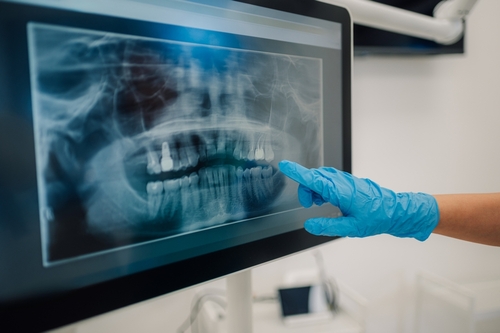Tooth loss alters more than a smile; it reshapes the rhythm of daily life. It changes the way we eat, how we speak, and even how we carry ourselves. And when unhealthy teeth remain, they extend those disruptions, serving as constant reminders of what has been lost and what still causes pain. For many, choosing a full mouth extraction becomes less about loss and more about release. It clears away the struggles tied to failing teeth and creates the chance to start anew. With a healthier foundation in place, treatments can finally build toward lasting solutions, restoring comfort in eating, ease in speaking, and a natural sense of self that feels whole again.
Do I Need a Full Mouth Extraction?
A complete full-mouth tooth extraction becomes necessary when keeping the remaining natural teeth would do more harm than good to your oral health. We recommend this step only when the damage is so extensive that it cannot be restored. You may need full extractions due to advanced tooth decay that has severely weakened most or all of your teeth, gum disease that has destroyed the bone and connective tissues, or a traumatic injury that leaves the teeth beyond repair. Chronic infections that do not respond to treatment can also make extraction the safest way to protect your overall health.
Choosing to remove all remaining teeth is never taken lightly. However, this approach is often the most effective way to halt ongoing oral disease and establish a healthier foundation. Full-mouth extraction gives us the opportunity to eliminate infection, reduce pain, and prepare your mouth for long-term solutions like mini dental implants.
What To Expect During a Full Mouth Extraction
Tooth extractions fall into two primary categories based on how much of the tooth is visible and the complexity of the removal. If a tooth is fully visible above the gum line, we use a simple extraction technique. We numb the area and gently lift the tooth using specialized tools. When a tooth is broken, impacted, or hidden beneath the gums, we use a surgical extraction. In these cases, we may section the tooth or carefully remove a small amount of bone to access it safely.
When we confirm that a full-mouth extraction is the best step for your health, we make sure you understand every part of the process. We know you might have questions about pain, healing, or what comes next—especially when you’re thinking about dentures or dental implants. We will explain your options, including how we help manage discomfort and how we can restore your smile.
Before we schedule your procedure, we’ll ask you to share a complete list of medications and any medical conditions you may have. If you feel nervous about the idea of treatment, we also review sedation options to help you feel as relaxed and comfortable as possible.
On the day of your extraction, we begin by administering anesthesia to keep you completely comfortable. We then remove each damaged tooth carefully to minimize trauma and support healing. In some cases, we can place mini dental implants during the same visit. However, depending on the condition of your mouth or the type of extractions needed, we may recommend a short healing period before placing implants. After your procedure, we provide detailed instructions to help you recover comfortably and prepare for the next phase of your treatment.
Restoring Your Smile With Mini Dental Implants
After a full mouth extraction, you have several options to replace your teeth. Traditional dentures restore the appearance of your smile and help with basic function. However, they do not provide the same level of long-term health benefits as mini dental implants.
Dental implants offer a stronger and more natural way to rebuild your smile. We place small titanium posts into your jawbone, where they bond with the surrounding bone through a process called osseointegration. This connection creates a secure foundation for a full arch restoration that looks and feels stable.
When the implant posts integrate with the jawbone, they take on the role of natural tooth roots. Each time you chew, the bone is stimulated, which prevents the gradual bone loss that usually follows tooth loss. Traditional dentures cannot provide this benefit. They rest on top of the gums without engaging the bone. Due to this key design flaw, the jaw can shrink over time, altering the comfort and fit of the prosthetic. By choosing implants, you protect the long-term health of your jawbone and create a secure foundation for lasting tooth replacement.
Learn More About Full Mouth Extraction
You deserve care that puts your comfort and well-being first. At the Mini Dental Implant Center of America in Union City, Dr. Diana Rodriguez has supported patients for more than 20 years with care designed to protect health and restore smiles. Contact us today to schedule your free consultation and learn if a full mouth extraction will suit your needs.

